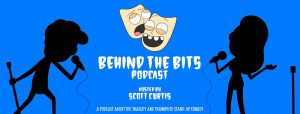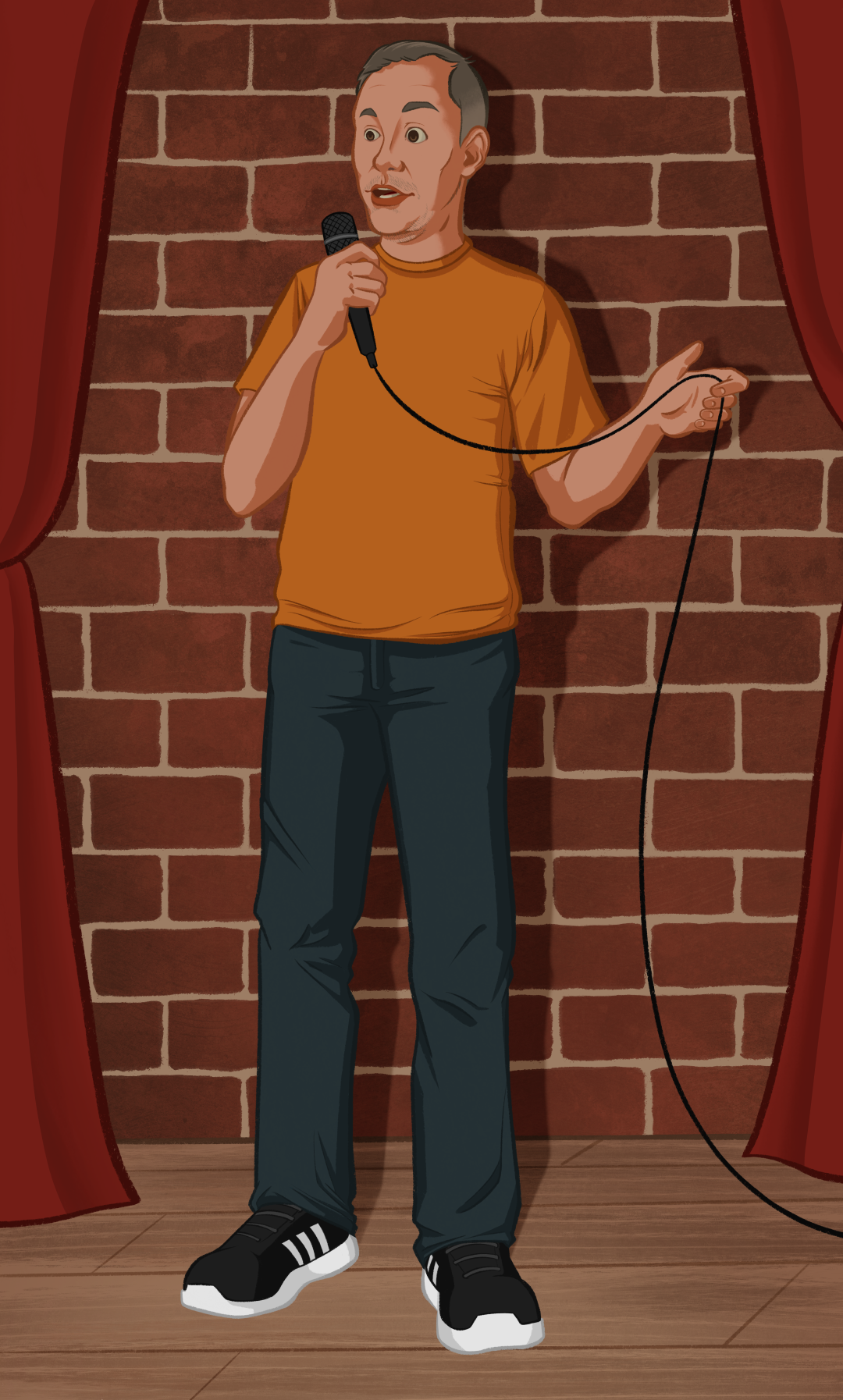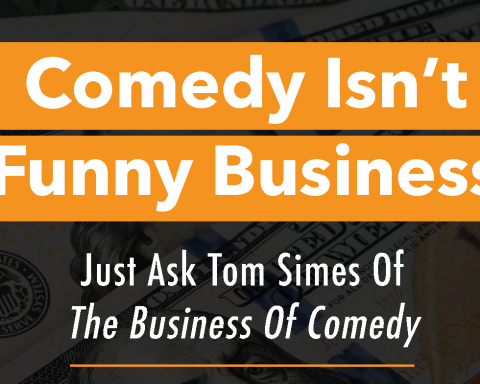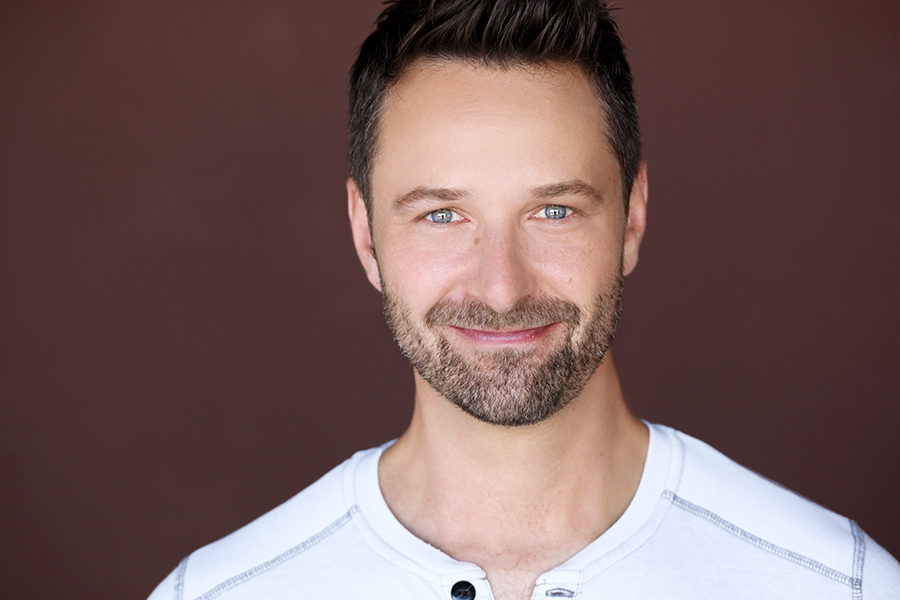Comedy can be a tough gig (pun intended). Most people are more afraid of public speaking than they are of death! If you’re one of them, you can probably imagine the anxiety around not just speaking to a group, but to an audience that has paid for you to make them laugh.
It takes a special talent to create humor on a consistent basis. No one knows that better than Scott Curtis, host of the Behind the Bits podcast, who took up standup comedy as somewhat of a hobby after his 50th birthday.
“I started doing comedy late in life. I was 52,” Scott reminisces. “I’ve been a fan of standup all my life. As I started doing it, I wanted to find podcasts and books that would make my hobby better. For me, standup will always be a hobby. I’m never going to try to be a star or anything like that, but if an audience comes to see me, I want to make sure they have the best experience they can. So, I started listening to podcasts, and found nothing that was exactly what I wanted.”
Like most good entrepreneurs do when they can’t find what they want, Scott created it—after about a year of planning and networking, Behind the Bits was born.
His intention? To dig into the craft of standup comedy. How do comedians write their comedic sets? Why do some jokes work and some fail? How do stand-up artists find their comedic voice? Which comedy clubs are the best, and which might a comedian want to avoid?
“One of the goals I had was to absolutely not make the podcast about me,” Scott states adamantly. “This is about comedy. That’s why my picture isn’t anywhere on the website or on the logos. I want the audience to remember the people I interview, not me.
“And eventually, I wasn’t just making a podcast… I was making friends.”
With the podcast now nearing 100 episodes, one might think a common theme or trait exists among Scott’s new friends in comedy. That isn’t the case, though. “It’s all across the board,” he exclaims. “They all approach comedy in different ways. They do their writing in different ways. Their reasons for getting into it are often different.”
There is often one common denominator, however: “Most comedians have a story,” contemplates Scott. “I think that is what drives most people in entertainment to do what they are doing.”
When pressed to give one all-encompassing trait, Scott offers this:
“All comedians love to talk about what they do. If I ask them that one question, I can get 20 minutes out of them. They are pretty passionate about it. Very few interviewers actually just let them talk, listen to the key points, and then ask a follow-up question about the things they are clearly passionate about. They like the art and the mechanics behind comedy, and they like to talk about it.”
Their talents also rarely transfer well to a traditional nine-to-five profession. “These are people who generally cannot work in a regular corporate structure,” Scott laughs. “For a large percentage of them, it just doesn’t work. They are very well suited for comedy.”
In addition, most comedians take great pride in their craft and are true professionals.
“I haven’t met many stupid comedians,” Scott mentions when discussing their passion for the profession. “They’re very aware of what’s going on. They soak everything in. They tend to be an empathetic type of people.”
Empathy is clearly a valuable trait in all people, including comedians. But during a time in history when sensitivity seems to be at its highest, how does empathy affect the delivery of comedy? Does it potentially mean the end of the craft as we know it, as it turns toward a watered-down, vanilla, G-rated variety? What is the future of comedy in this environment?
Scott offers an intriguing perspective: “I think we have a perfect storm today. The most marginalized people in this country are pretty much all speaking up at the same time. We have the Me-Too movement. Racism is still a thing. The LGBTQ community, too. They are all fighting to get their place. I compare it to the Civil Rights Movement. Martin Luther King Jr., Malcolm X, and others, if they hadn’t kept pressing the Civil Rights Movement, it wouldn’t have gone anywhere. Sometimes, you take one step forward and two steps back.
“Now, we’re in a situation where maybe things are a little bit better for the LGBTQ community. Maybe awareness is up for women, and they aren’t being harassed as often. And maybe the Black community is being heard more.
“I think comedians have the right to say whatever they want, as long as it’s not hate speech. But you can certainly get with the times and not piss people off.”
It’s quite probable that the best comedians, the ones who really understand their craft and how to be entertaining without being insulting, will rise to the top during this time.
Scott talks about this very subject in Episode 1 of Behind the Bits. “One of the things that Tom Dreseen said in that interview was that, if you think you might have questionable material, you should simply ask yourself whether it’s funny. One of Tom’s claims to fame was that he was in the first Black-and-White duo with Tim Reid. When he performed in Chicago, his audiences were almost always all Black. Tom could say a lot of things that could have been misconstrued, but they were funny, and the audience knew where it was coming from. If [the jokes] come from a place of punching down, it’s not funny anymore. But if they come of commiseration, you’re usually okay. It’s just gotta be funny, too.”
Scott went on to explain that pushing the envelope a little with a bit can actually create positive discussion, even when there is some blowback. “You can do that type of humor, but your whole act can’t be about punching down.”
Not “punching down,” as Scott calls it, ties into the number-one lesson he has learned from producing Behind the Bits:
“Be nice. You can be a real *sshole and burn bridges everywhere, but it’s much better to be nice to everyone. That next person you meet may be the next big star, and he or she may take you on a worldwide tour. So, be nice to everybody.”
It’s pretty clear that Scott Curtis is a genuinely nice guy. You can tell that in just a few seconds of talking to him or listening to one of his podcast episodes. So if you want to listen to a nice guy and a plethora of great guests, while learning about the art and craft of comedy, Behind the Bits is the show for you.
February 2022 Issue













